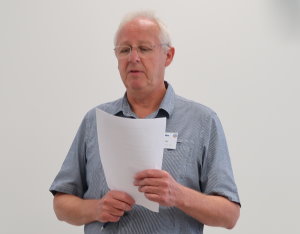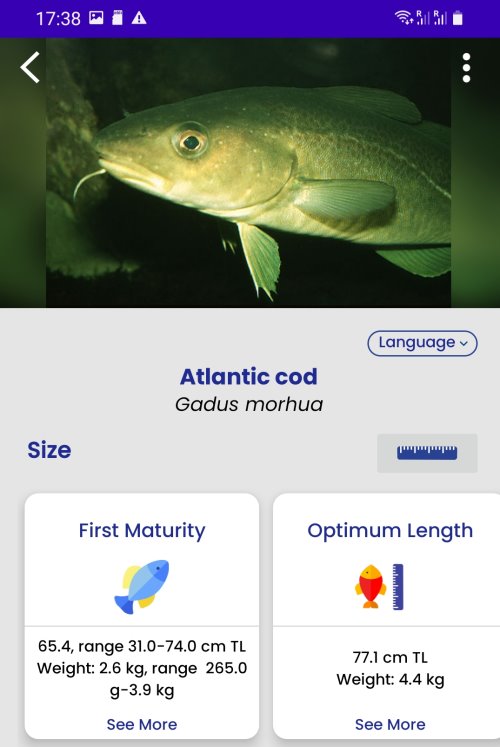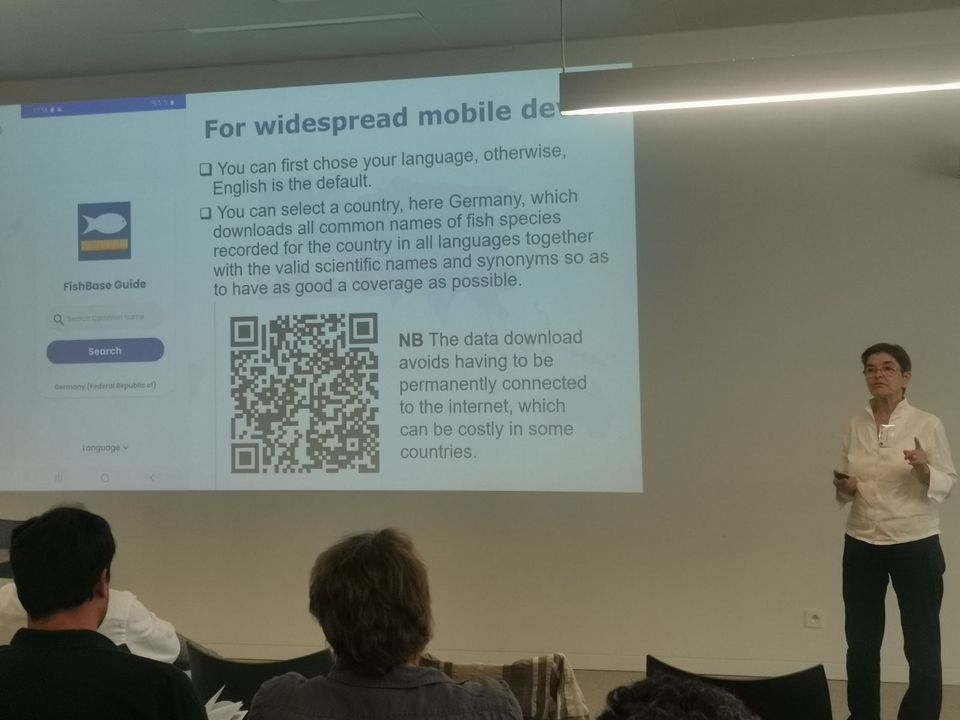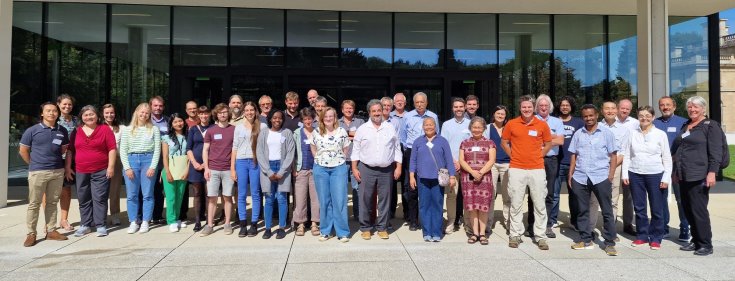The FishBase Team of the Royal Museum for Central Africa in Tervuren, Belgium, headed by Prof. Jos Snoeks, hosted the annual FishBase-SeaLifeBase Symposium for the fourth time on 4 September 2023. The public event featured interesting talks by representatives of many of the organisations already sustaining work on the global biodiversity data systems covering all fish species and all non-fish animals in the ocean or planning to do so.

In addition, several researchers from other Belgian research institutes gave presentations of related work. As a new feature two flash talk sessions offered further research updates for online and onsite participants. The scientific advances presented thanks to using these data systems were impressive.
Rainer Froese, one of the ‘fathers’ of FishBase, explained advances in resources analysis using prior knowledge available in the FishBase and SeaLifeBase data systems that should now make it much easier to provide management relevant advice even for resources with less data than required for conventional analysis. Note in this context that this is the case even for fish and invertebrate stocks in countries with good research infrastructure like the EU.
Lauren Sallan of the Okinawa Institute of Science and Technology, Japan, provided insights from the work on fossils she is conducting with her team. That is exciting and could lead to including fossils in FishBase and thus help boost work on the understanding of evolution of vertebrates. In the ensuing short conversation, the acclaimed book “
Guest speaker Peter Mullen of Sunbird TV presented several highly successful apps done for species identification of birds and bees using AI to train the app. He suggested that this might also become possible for fish. One type of application could thus permit divers to produce more reliable entries for their cherished log books. Conversely, that might also offer opportunities for more citizen science similar to what is common place in bird watching. Sounds amazing! We hope it can work out.

Indefatigable Jessica Meeuwig of the University of Western Australia (UWA) took the audience on a journey of non-distructive underwater observations with her baited remote underwater video system (BRUVS).
Daniel Pauly, the other ‘father’ of FishBase, excelled with a further twist of his powerful Gill Oxygen Limitation Theory (GOLT) by showing that the abnormally high concentration of carbon dioxide in the blood (hypercapnia), which occurs when the body volume exceeds the capacity of the gill surface to provide sufficient oxygen, is the trigger for fish to become aware of the environmental stimuli required for maturation and eventual spawning. He showed that the mechanism works across all bony fish, cartilaginous fish such as sharks, and even for the living fossil, the coelacanth (Latimeria chalumnae).
Lots of more interesting presentations made time fly by. The contribution of Mundus maris was a short report on the collaboration with Quantitative Aquatics (Q-quatics) in developing the FishBase Guide app presented by Cornelia E Nauen. It now includes translation and weight estimates to match measured lengths. Provided are size at first maturity, optimum length to secure sustaining maximum catches and maximum length reported in the literature. Additional explanations of the metrics can be accessed by clicking on the icons (See More). Clicking on the cm-icon to the right underneath the common FishBase name produces a graph which illustrates the different ways to measure fish length depending on the shape of the caudal fin. The app can be downloaded free of charge from the Google Play Store using the QR code on the slide to the right.
Fish species of interest can be searched for each country by using common names or scientific names, if known. The app also provides the IUCN Red List status in relation to the degree of extinction threat and its geographical distribution.
The slides are available here.

This is not the place to summarise all the interesting presentations. Suffice to say that the public symposium was an excellent opportunity to catch up with latest analytical developments using the power of FishBase and SeaLifeBase. These global biodiversity data systems that have been built up over the last more than 30 and 15 years respectively. They are hosted by Q-quatics in the Philippines and its highly motivated research and encoding team. Several thousand voluntary collaborators have contributed over the years. The team has extracted and standardised data from tens of thousands of books and research papers to create this authoritative source of information through a large collective effort. This way, explorations into the fundamentals of life became possible. The analyses enabled by inquisitive and creative minds are now indispensible sources of learning. They help develop for our understanding aquatic biodiversity and help find solutions to the sixth mass extinctions of species and food insecurity looming large. With some 700,000 monthly visits of the website and stories told about each fish and marine organism it’s like an online library of aquatic life.
Not the least, thanks to the scientific collaborations countless friendships and inspiring human relations have emerged that underpin the commitment of this amazing group of people to make the accumulated knowledge of humankind about aquatic biodiversity accessible to everybody. If we make headway against overlapping global crises, it will be also thanks to FishBase and SeaLifeBase. You can help maintain these awesome resources and team behind them by a donation. One way is to sponsor a species summary page for a year for only USD100. Your support will be visible to all on the websites. It’s easy. Check out the donation button.

Small-Scale Fisheries Academy
- Make Fishing Fair in the EU, 25 March 2025
- Human – Biodiversity Relationships Across Scales
- World Fisheries Day, 21 November 2024, celebrated in Nigeria
- Mundus maris participated in the 2024 World Fisheries Day organized by Canoe and Fishing Gear Association of Ghana (CaFGOAG).
- Mundus maris contribution to the UNOC3 public consultation
- Small-Scale Fisheries Summit in Rome, 5-7 July 2024
- Regional Symposium on European Small-Scale Fisheries, Larnaca, Cyprus, 1-3 July 2024
- Baltic Fisheries Emergency Meeting, Brussels, 26 June 2024
- Ambivalent role of Market and Technology in the Transitions from Vulnerability to Viability: Nexus in Senegal SSF
- Shell fisheries as stewardship for mangroves
- African edition of 4WSFC in Cape Town, 21 to 23 November 2022
- World Fisheries Day, 21 November 2023
- Webinar: Nigeria’s Fisheries challenges and opportunities
- Presenting the FishBase app at the Symposium in Tervuren
- MARE Conference on Blue Fear – Mundus maris reflects
- The Transition From Vulnerability to Viability Through Illuminating Hidden Harvests, 26 May 2023
- EGU sessions focused on geoethics and joint learning, 23-28 April 2023
- Solidarity with artisanal fishers in Senegal and Mauritania
- The legal instruments for the development of sustainable small-scale fisheries governance in Nigeria, 31 March 2023
- Tools for Gender Analysis: Understanding Vulnerability and Empowerment, 17 February 2023
- Community resilience: A framework for non-traditional field research, 27 January 2023
- Sustainability at scale – V2V November webinar
- European edition of 4WSFC in Malta, 12-14 September 2022
- Mundus maris contributes to SSF Summit in Rome
- Women fish traders in Yoff and Hann, Senegal, victims or shapers of their destiny?
- The Academy continues its work in Yoff
- Illuminating the Hidden Harvest – a snapshot
- Virtual launch event FAO: International Year of Artisanal Fisheries and Aquaculture
- The Small-Scale Fisheries Academy as a source of operational support to PA Guidelines
- World Fisheries Congress, Adelaide, 20-24 September
- Mundus maris supports the fight of Paolo, the fisher, in Tuscany, Italy
- Catching-up – SSF Academy Yoff, 27 Febr. 2021
- Strengthening capacities of the actors for sustainable small-scale fisheries
- Testing training methods during the pilot phase of the SSF Academy in Senegal
- A premiere – launch of a Small-Scale Fisheries Academy in Senegal
